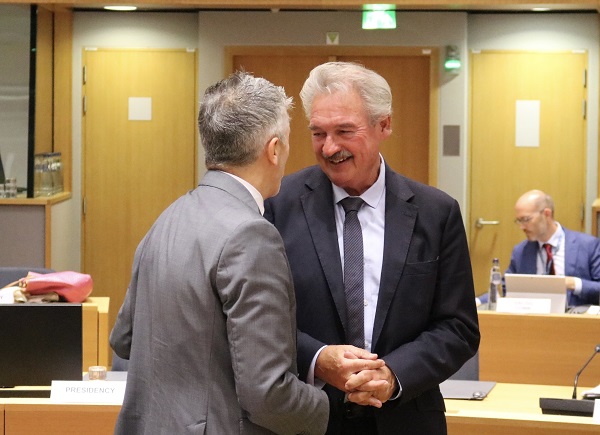 (L-R) Fernando Grande-Marlaska, Spain's Minister of Interior; Jean Asselborn, Luxembourg's Minister of Foreign and European Affairs;
Credit: MAEE
(L-R) Fernando Grande-Marlaska, Spain's Minister of Interior; Jean Asselborn, Luxembourg's Minister of Foreign and European Affairs;
Credit: MAEE
Luxembourg's Minister of Foreign and European Affairs and Minister of Immigration and Asylum, Jean Asselborn, participated in the meeting of the Justice and Home Affairs Council of the European Union in Brussels, Belgium on Thursday 28 September 2023.
Ministers mainly discussed the external aspects of migration after the events which shook the island of Lampedusa and took stock of the negotiations on the new migration and asylum pact. The ministers responsible for migration also endorsed the extension of temporary protection for people fleeing Russian aggression in Ukraine until March 2025.
After being briefed by the Vice-President of the European Commission, Margaritis Schinas, on his recent visits to Ivory Coast, Guinea and Senegal, the ministers listened to a presentation on migratory routes by the European Commissioner for Home Affairs, Ylva Johansson. The Commissioner noted an increase in pressure on almost all migration routes, with an increase in crossings at the EU's external borders, in Cyprus, the Canary Islands, the island of Lampedusa, the Greek islands and at the borders with Belarus.
During the discussion, Minister Asselborn expressed support for the Spanish Presidency of the Council of the European Union by insisting on the need to "place our efforts in a preventive rather than reactive logic". He stressed that migration management can only be one pillar among others; a pillar that supports stable and mutually beneficial relationships with the EU's partners. The external dimension will not be able to do without a reform of internal rules, i.e. that of the migration and asylum pact which Minister Asselborn said would make it possible to put in place a "coherent European migration policy".
He stressed that the EU "must adopt a truly holistic approach which is based on full respect for fundamental rights and international law", before continuing: "Legal migration plays a crucial role in this context. The EU started working on this in 2015 at the Valletta Summit [on Migration], so it is a promise worth honouring. Legal migration is not only an important lever, it is also a response to our own demographic and economic needs."
Minister Asselborn added that, for this approach to be truly holistic, cooperation between equals must span all areas and sectors for which there is an interest on both sides. "This is the only way to build overall resilience in our relationships and avoid the creation of new dependencies," he noted. The minister welcomed the commissioners' announced plans to maintain a constructive dialogue with Turkey, which hosts a large community of Afghan and Syrian refugees, among others.
The Spanish Presidency concluded the debates on the first point of the agenda by proposing partnerships which are part of prevention, rather than reaction. It proposed an approach based on a feeling of shared and mutually beneficial responsibility, as well as on mutual trust established through regular contacts, joint operational cooperation, particularly in the fight against trafficking networks but also in matters of legal migration, and increased predictability fuelled by permanent and stable material and financial assistance.
Secondly, the ministers looked at the negotiations on the migration and asylum pact. Minister Asselborn recalled that the urgent priority must remain the finalisation of these negotiations. He emphasised the importance of moving forward on the crisis resolution, of taking into account the situation of vulnerable people and of relaunching political trilogues with the European Parliament on all the instruments of the pact.
According to Luxembourg's Ministry of Foreign and European Affairs, the ministers made progress on resolving the crisis, but were unable to ratify a political agreement. The Spanish Presidency and the European Commission said this political agreement should be finalised in the coming days.








